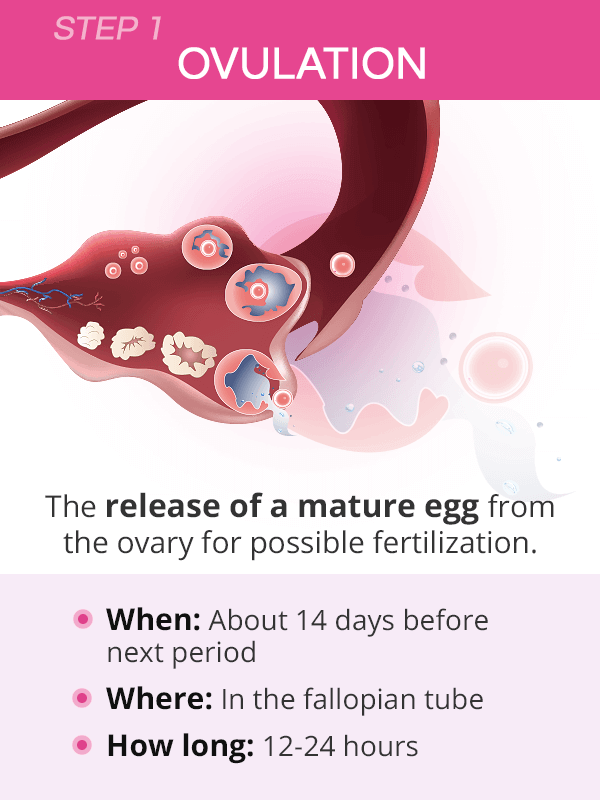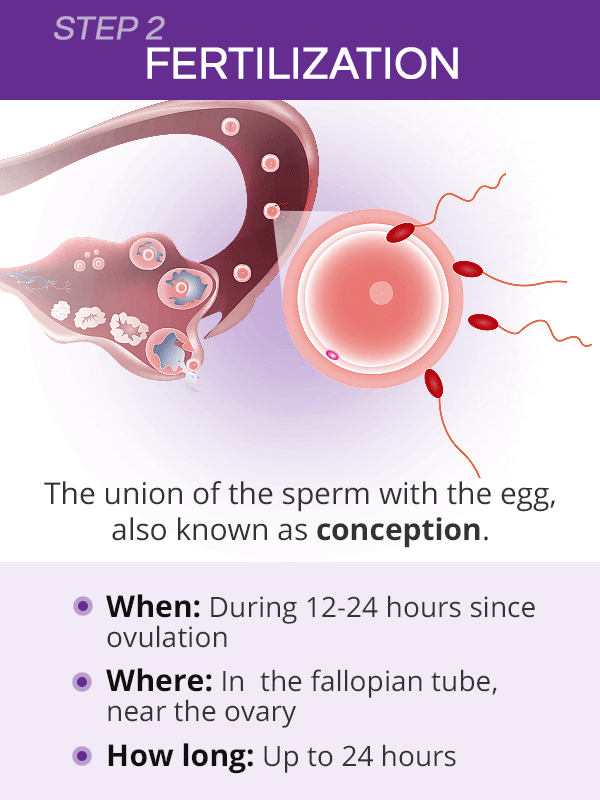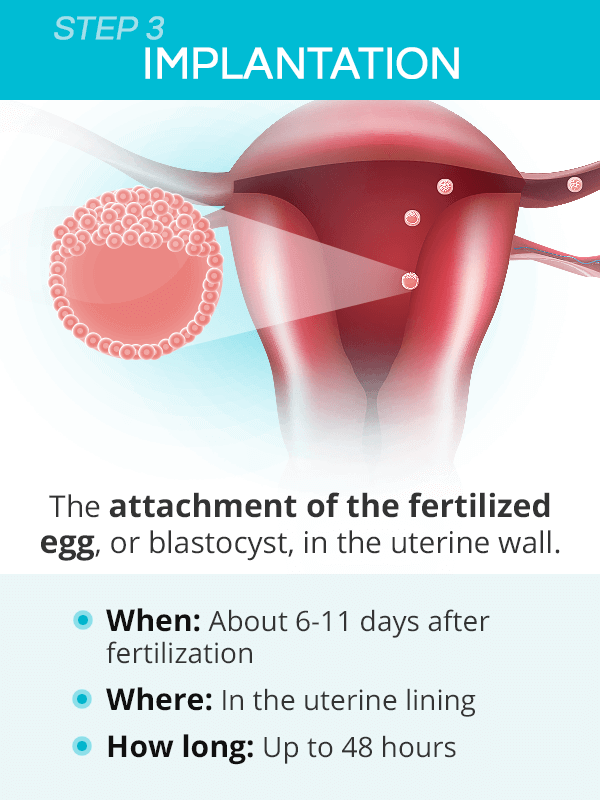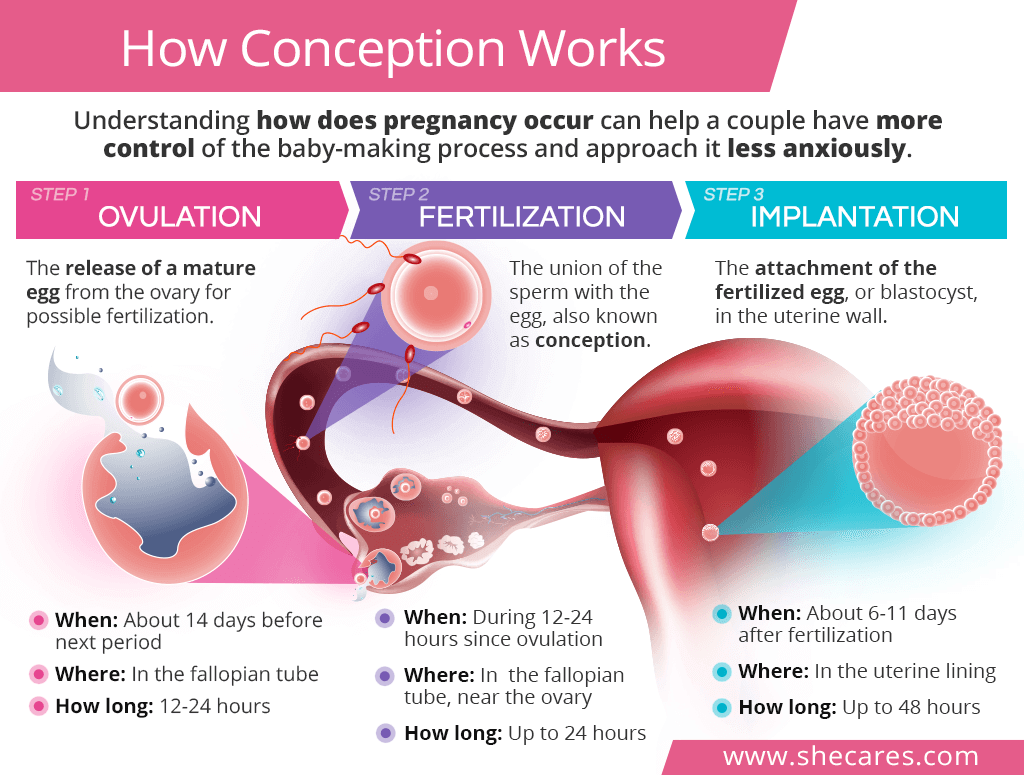1. Ovulation

What is Ovulation?
Ovulation is the release of a mature egg from the ovary for potential fertilization. Without the egg release on ovulation day, natural conception could never take place.
Normally, numerous eggs are maturing in both ovaries, but only one is released per ovulation cycle. If two or more are released and fertilized, pregnancy with twins or triplets can ensue.
When does Ovulation Occur?
Ovulation occurs on a monthly basis roughly in the middle of a woman's menstrual cycle, or two weeks before her next period.
There are numerous helpful tools, such as ovulation tests or ovulation predictors, which can help women estimate their ovulation date to make conception efforts more productive.
Where does Ovulation Occur?
The egg is released into one of the fallopian tubes, parts of the female reproductive system that connect the ovaries with the uterus, which is where ovulation occurs. Fallopian tubes are also called oviducts.
For How Long does Ovulation Last?
Ovulation lasts for about 12 to 24 hours.1 It is the only time during which the egg can be fertilized if sperm are also present in the oviduct. Otherwise, an unfertilized egg will travel to the uterus to be disintegrated and shed during the next period, roughly two weeks later.
2. Fertilization (Conception)

What is Fertilization?
Fertilization is the union of the sperm with the egg. In biology, fertilization is synonymous with conception, the beginning of human development.
How Long After Ovulation Does Conception Happen?
Because the egg is only viable for up to 24 hours since its release, fertilization can only happen in that time frame. As such, the sperm have to be present in the fallopian tube during that one-day window in order to fertilize the egg.
However, because the sperm can live in the reproductive tract for up to five days, having unprotected sex any time during that six-day fertile window (five days before and on the ovulation day) can potentially result in fertilization.
Where does Fertilization Occur?
Conception occurs in the fallopian tube near the ovary, most commonly in the portion called the ampullary-isthmic junction.
How Long does Fertilization Take?
The process of fertilization is a daunting task and can take up to 24 hours. It consists of the sperm penetrating the egg's shell, fusing with its cytoplasm, and triggering a series of genetic divisions. At fertilization, the entire genetic make-up of a baby, including the gender, is determined.
Once fertilized, the egg will remain in the ampulla for 48-72 hours to then continue moving down the fallopian tube towards the uterus while rapidly multiplying. It might take three to five days from fertilization to reach the uterus for implantation.2,3
3. Implantation

What is Implantation?
Implantation is when the fertilized egg, now called a blastocyst, attaches itself to the uterine wall. It is a crucial step in conception as without implanting in the uterus, the egg would just be eliminated through the vagina.
How Long After Conception Does Implantation Occur?
Implantation of the blastocyst in the uterus can occur between 6 to 11 days after conception, with 8 days being the average.4
Where does Implantation Occur?
Implantation occurs in the lining of the uterus, called the endometrium. The endometrium goes through various structural changes to become receptive to the egg around the sixth day following ovulation and remains so for four more days. This period is known as an implantation window.
In some cases, the fertilized egg attaches itself in regions outside the uterus, such as the fallopian tube, a situation referred to as an ectopic pregnancy. Because only the uterus can support the growing embryo, outside-the-uterus implantation cannot progress into healthy pregnancies.
How Long does Implantation Take?
The entire process of the egg implanting itself in the uterine wall takes about 48 hours.
Some women might experience light bleeding often called implantation bleeding, although its absence does not mean that implantation has not occurred. Generally, pregnancy can be confirmed on the first day of a missed period, but it is sometimes possible to get a positive reading after the 8th day since fertilization.
Key Takeaways
The anticipation of positive pregnancy results might be nerve-wracking for many women. Naturally, their minds are often flooded with anxious questions about how exactly does conception work, including how long does fertilization take or how many days after ovulation is implantation, among others.
From a biological perspective, conception is not an easy process. It involves a series of three reproductive events that are precisely timed and inter-dependent to enable pregnancy. It all starts with ovulation, during which a mature egg is released from the ovary to await the sperm for up to 24 hours. When the sperm cell manages to penetrate the egg's protective shells, fertilization or conception is said to have occurred. Once fertilized, the egg will multiply while moving to the uterus for the final step, implantation, which can occur up to 11 days after fertilization. Understanding how does pregnancy occur can help a couple have more control of the baby-making process and approach it less anxiously.
Sources
- Columbia University. (n.d.). Fertilization. Retrieved January 21, 2019 from http://www.columbia.edu/itc/hs/medical/humandev/2004/Chapt1-Fertilization.pdf
- Embryology. (2018). Fertilization. Retrieved January 18, 2019 from https://embryology.med.unsw.edu.au/embryology/index.php/Fertilization
- Human Reproduction Update. (2006). Endometrial receptivity markers, the journey to successful embryo implantation. Retrieved January 18, 2019 from https://www.ncbi.nlm.nih.gov/pubmed/16982667
- University of Washington. (n.d.). Implantation. Retrieved January 28, 2019 from https://courses.washington.edu/conj/bess/implantation/implantation.htm
Footnotes:
- Mayo Clinic. (2020). Ovulation signs. Retrieved September 8, 2021 from https://www.mayoclinic.org/healthy-lifestyle/getting-pregnant/expert-answers/ovulation-signs/faq-20058000
- University of California. (n.d.). Conception: How It Works. Retrieved September 8, 2019 from https://www.ucsfhealth.org/education/conception_how_it_works/
- University of Michigan Medical School. (2000). First Week (Days 1-7). Retrieved September 8, 2019 from https://www.med.umich.edu/lrc/coursepages/m1/embryology/embryo/03firstweek.htm
- Journal of Human Reproductive Sciences. (2015). Understanding implantation window, a crucial phenomenon. Retrieved September 8, 2021 from https://www.ncbi.nlm.nih.gov/pmc/articles/PMC3409914/


